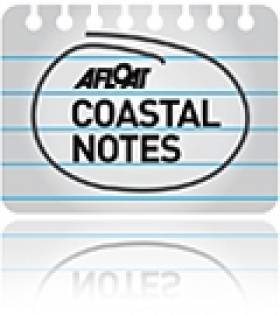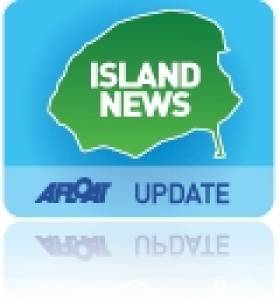Displaying items by tag: PART 8 Scheme
Consultants to Carry Out Survey of Coliemore Harbour
#COLIEMORE HARBOUR FERRY – Asides the controversial issue of the granting for an exploratory oil well drill license off Dalkey, local residents group have also stepped up a campaign since the summer to restore the island ferry which has not been operating in recent years, reports Jehan Ashmore.
As previously reported on Afloat.ie, Dun Laoghaire-Rathdown County Council's recent unveiling of a consultant's report of the proposed PART 8 Scheme to upgrade Dalkey Island harbour, also sees the same consultants appointed to carry out a separate survey of Coliemore Harbour, the traditional mainland embarkation point of the ferry run by generations of local families.
The consultants Malachy Walsh & Partners are to carry out a structural survey on the condition of the small stone cut harbour completed in 1868, which aswell as a tourist attraction is an amenity throughout the summer for anglers, divers and kayakers alike.
DLRCC which owns the harbour, have deemed the piers unsafe and claim concerns over public safety issues for those accessing the harbour when commercial boats were in operation. It is expected that DLRCC are to receive the conclusions of the report though not until February or March, this is to enable the consultants to monitor winter weather impacts on the harbour.
The council have claimed that repair costs could be prohibitive, possibly running into millions and it is understood that such expenditure were not factored into council's Capital Programme 2012-2016. As previously alluded, the PART 8 scheme exclusively deals with Dalkey Island alone where there also plans to restore the Martello Tower and Gun Battery, though not St. Begnet's Church which is the responsibility of the OPW.
The ferry restoration group, has also called for the short five-minute ferry ride to the 22-acre island be reinstated by a licensed operator. The licensing is under the remit of the Marine Survey Office at the Department of Transport and a future ferry service would require an open tendering process.
It has been feared by locals that the demise of a boat service arising from Coliemore's closure to ferry services, could lead to a temporary or longer term service running from Dun Laoghaire.
As previously reported on Afloat.ie a new cruiseliner tender dock facility was installed earlier this year as part of the Dun Laoghaire Harbour Company masterplan, where the facility would also be used for boat tours of Dublin Bay and to Dalkey Island.
It has been suggested that should such a service run, that a RIB based craft would be likely used on the longer exposed crossing to the island and taking up to 25 minutes. The consequences of an enhanced ferry operation and its potential impacts on the island were discussed as part of last month's inaugural Dalkey Island Forum.
Helicopters Role in Proposed Upgrade of Dalkey Island Harbour
#DALKEY ISLAND FERRY – Up to 500 helicopter flights over an 8-day timeframe could be operating across the 300m wide Dalkey Sound, following proposed plans to upgrade the island's slipway harbour were unveiled last week, reports Jehan Ashmore.
According to consultants that carried out a report for Dun Laoghaire-Rathdown County Council, the proposed upgrade of the slipway, under a PART 8 Scheme, could see a site near Sorrento Point on Coliemore Road, as the desired landing location to load helicopters heading for the island with machine plant, equipment and materials.
Under the proposed development of up to 12 weeks to complete, work would involve raising the existing slipway to create a stepped top surface, widening of the existing channel, a new raised pier section with transitional steps, a handrail, mooring rings and an access ladder.
The consultants Malachy Walsh & Partners and Shaffrey Associate Architects have however indicated that Dun Laoghaire may be an alternative helicopter embarkation point. Total construction costs of the project are estimated at approximately €228,000, however should Dun Laoghaire be opted instead, this would double lift costs compared to Dalkey, adding about 84% to the overall helicopter costs.
The use of helicopter transportation is not new to the island, as in the early 1990's works on the island harbour also saw flights running back and forth to the grounds of the Dalkey Island Hotel, now occupied by a luxury apartment complex.
The consultant's report also adds that Dalkey Island is designated as a Special Protection Area (SPA) for roosting the common, artic & roseate tern species in accordance with the requirements of the EU Habitats Directive 1992, however given the scale and the location of the slipway works, the report concludes that a full appropriate assessment screening would not be required for the Dalkey SPA because it is considered not to have a significant effect on this site.
As previously reported on Afloat.ie the island has also been proposed as a Special Area of Conservation (SAC) as part of six Natura 2000 sites within Irish waters.
Plans and particulars of the proposed slipway upgrade of the Dalkey Island PART 8 Scheme development including timescale of public consultation process, can be found in greater detail to include downloadable PDF documents, by following this LINK.































































